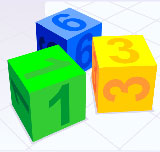Hauptseite
Aus Online Mathematik Brückenkurs 1
| \displaystyle \text{@(a class="image" href="http://smaug.nti.se/temp/KTH/film6.html" target="_blank")@(img src="http://wiki.math.se/wikis/2008/forberedandematte1/img_auth.php/0/0a/Elin.jpg" alt="Film om Elin")@(/img)@(/a)} |
How did it happen that Elin became interested in mathematics?
Watch the video in which Elin Ottergren,a mentor on the course and former "Internet" student, relates how she became interested in mathematics.
There is now an easy way to be better prepared for your university studies.
This course is meant for those of you whose studies include mathematics and who wish to be well prepared before the start of the course. The course is even suitable for those of you who wish to refresh their mathematics for whatever reason.
The course is a designed as a bridging course between high school and university. Even those of you who did well in high school mathematics are recommended to read the course. It is eligible for student financial assistance and can be read studied entirely on the Internet. The course is a cooperation between several of the country's universities and the Centre MATH.SE.
You timetable yourself your studies and thus can easily adapt your studies to fit in with any other plans you may have.
Tregistration and access to forums, support, examination and a personal mentor
- The course literature is open and accessible via the Internet. You can register on the course anytime during the year by means of the electronic form on www.math.se and you will be given a user name and password that provides access to all course materials, discussion forums, support, monitoring and tests. You also be assigned a personal mentor to help you do well in your studies.
Supervision and examination
You may at any time take part in online discussions with fellow students, ask questions and receive guidance from teachers. Examination is via the Internet as you work on the course. Some of our universities offer supervision and local assistance in addition to what is available on the Internet.

Please note that the course has been designed on the assumption that calculators are not used.
When you get to university, you will not be allowed to use calculators in your "exams", at least in the basic courses.In the advanced courses in mathematics one has hardly any use of calculators, as the mathematics is more about understanding principles than performing calculation. For example, it is important to understand why 7 + 3 is the same as 3 + 7, than to be able to carry out the additions and get the answer 10.
How to get the most out of this course
- *Start by reading the review of the theory to a section and work through the examples.
- Then work through the practise problems and try to solve them without using a calculator. Make sure that you have reached the right answer by clicking on the answer button. If you do not have the right answer, you can click on the solution button to see how the problem is done.
- Proceed by answering the questions in the basic test of the section you are in.
- If you get stuck,,see if this particular topic has been discussed in the forum.Pose a question if you have any queries.. Your teacher (or a student) will respond to it within a few hours.
- When you are finished with the exercises and the basic test belonging to a section you must do final test to obtain a pass for the section. Here the requirement is answering correctly three questions in a row in order to move on.
- Have answered correctly in both basic and final tests, means you have passed that particular section and can advance to the next part of the course.
PS If you feel that you are familiar with the contents of a section you can to go directly to the basic and final tests. All answer to a test must be correct, but you may redo the test several times, if you do not succeed at first attempt. It is your final results, which appear in the statistics.
